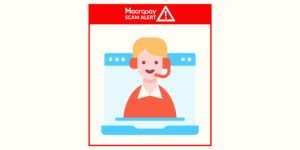Scammers still prowl our physical and digital surroundings in search of easy targets. In this day and age where technology is even more essential than ever, they expanded their insidious enterprise to include tech support scams. This Macropay Scam Alert lists some of their ploys and how to steer clear of these scammers. As more challenges present themselves in our daily lives, more people develop creative ways to cope and rise above the issues. The pandemic encouraged many people to bring their ventures into the online space, the rising gas prices paved the way for a shorter work week for some companies, and some emerging entrepreneurs developed novel solutions for the problems we just accepted as the norm. While it is warming to think that every one of us moves on a similar path to success, there are indeed people who choose to take the quicker albeit more sinister path to wealth; scamming other people.
As more challenges present themselves in our daily lives, more people develop creative ways to cope and rise above the issues. The pandemic encouraged many people to bring their ventures into the online space, the rising gas prices paved the way for a shorter work week for some companies, and some emerging entrepreneurs developed novel solutions for the problems we just accepted as the norm. While it is warming to think that every one of us moves on a similar path to success, there are indeed people who choose to take the quicker albeit more sinister path to wealth; scamming other people.
What is a tech support scam?
Tech Support Scam is a fraudulent activity involving a person who poses as a legitimate tech support specialist to solicit payments from unsuspecting users.
What methods do they use to deploy the scam?
Tech support scammers reach their potential victims through various, often unexpected methods. Everyone is at risk, although the less tech-savvy population and the older generation fall prey to these scammers more often.
Unsolicited phone calls
If you receive a cold call from a random person telling you that they are calling on behalf of a well-known company, you should first check if you have placed an order for a technician. If you have not, chances are these people are just trying to sell solutions for a problem that does not exist. For most cases, dropping the call right away does the trick.
Virus alerts
Most of the time, popups are chock full of malware and other forms of computer viruses. As a rule of thumb, one should only interact with a pop up if they are expected to appear. However, there are some pop ups that seem legitimate and are even offering to help through a toll-free number. Do not take the bait. Calling the number will only connect you to the scammer, who will proceed to convince you to pay or give your payment information.
What to do if you are a victim of tech support scam?
Check Your Payment Channel
The first thing to do when you already made the transaction through your debit or credit card is to call your bank and have the charges reversed. Oftentimes, banking institutions will undertake an investigation prior to reversing the fraudulent transaction.
However, for other methods, you should contact the company or institution that enabled the transaction. For example, you can contact the gift card company if this was the way you completed the transaction.
Report to the Authorities
Find the nearest cyber crime unit in your area and report the scam. If they cannot help you, they will direct you to an institution that can help. This is particularly important for those who were scammed by con artists that live in another country.
The best way to avoid getting scammed is to be educated and learn to recognise the red flags. However, if you have already fallen for the trick, the best way forward is to keep calm and try the simple methods mentioned above to get your money back.
Unfortunately, some scams are too intricate that once you have sent your money, it is near impossible to trace. We urge you to be aware and look after your less tech-savvy family members and friends who may be vulnerable to fraud such as the tech support scam.
For more Macropay Scam Alerts and insights, visit www.macropay.net





















